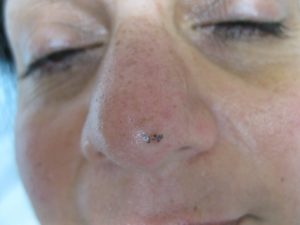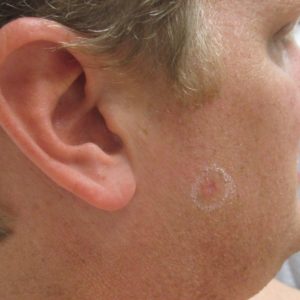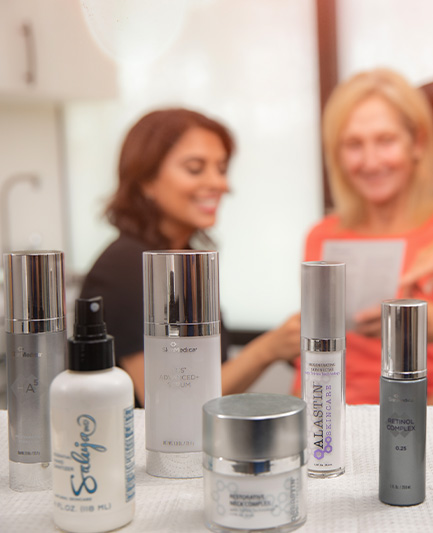SEARCH OUR WEBSITE
On This Page
- What Are The Signs Of Basal Cell Carcinoma?
- Who Is Most At Risk For Basal Cell Carcinoma?
- Where Does Basal Cell Carcinoma Usually Develop?
- How Is Basal Cell Carcinoma Treated?
- Does Health Insurance Cover Treatment For Basal Cell Carcinoma?
- Frequently Asked Questions
- Creating Lifelong Relationships with Our Patients
- Contact Us For Your Customized Consultation
- Reveal Your Most radiant Skin
Basal cell carcinoma is the most common form of skin cancer, and many people will get it during their lifetime. Residents of Melbourne, Indialantic, Viera, Brevard County, the beaches, and nearby communities can seek skin cancer screening or treatment for basal cell carcinoma at Dermatology + Plastic Surgery, led by board-certified dermatologist Anita Saluja, MD and double board-certified plastic surgeon Rebecca Novo, MD.
What are the signs of Basal Cell Carcinoma?
Basal cell carcinomas appear as a flesh-colored, pearl-like bump or a pinkish patch of skin, most commonly on the head, neck, and arms, although they may form anywhere on the body, including the chest, abdomen, and legs. These are some warning signs that a mole or growth on your skin may be basal cell carcinoma.
- A growth or mole that is flat or sunken
- A growth or mole that bleeds easily
- A scar with a waxy feel to it
- A sore that keeps appearing repeatedly on the skin
- A cluster of shiny red or pink growths that develops slowly
- A pimple that never seems to heal
- A pearl-shaped, flesh-colored lump on the skin
- A patch of reddish dry skin that never seems to go away

Who is most at risk for Basal Cell Carcinoma?
Basal cell carcinomas are most commonly found in people who have fair skin, although they can develop in people with darker skin as well. Basal cell carcinomas develop after years of excessive exposure to the sun or indoor tanning beds. People over the age of 40 who spend a lot of time outdoors or have frequently used tanning beds in the past are most at risk.
Where does Basal Cell Carcinoma usually develop?
Basal cell carcinoma usually develops on areas of the body that are exposed to sunlight on a regular basis, such as the face, ears, back of the neck and hands, and in bald areas of the scalp, but can occur anywhere.
How is Basal Cell Carcinoma treated?

Basal cell carcinoma may be treated by several methods, depending on the size and type of lesion, and its location on the body. Surgical excision may be used to remove cancerous tissue, and frozen section surgery or Mohs surgery may be performed if the tumor is of certain pathology and on the face, scalp or ear. This procedure involves gradually shaving off layers of skin until all of the malignant cells are completely removed. Other less common treatment options may also include oral medications, topical creams, laser surgery and curette with cryosurgery.
Does health insurance cover treatment for Basal Cell Carcinoma?
In most cases, your health insurance will cover part or all of the cost for treatment of basal cell carcinoma. To help patients manage any costs that may not be covered by health insurance, our office offers various payment options.
If you have been diagnosed with basal cell carcinoma, or have discovered a suspicious growth on your skin, contact Dermatology + Plastic Surgery, led by board-certified dermatologist Anita Saluja, MD and double board-certified plastic surgeon Rebecca Novo, MD,, and serving residents of Melbourne, Indialantic, Viera, Brevard County, the beaches, and nearby communities in Central Florida, to inquire about skin cancer screening, surgery, and treatment options for basal cell carcinomas.
Click here to learn more about our new medical dermatology practice, explore our comprehensive services and connect with our expert medical team.
Frequently Asked Questions
What happens if basal cell cancer is left untreated?
Can a basal cell carcinoma turn into melanoma?
What does a basal cell carcinoma look like?
Should I worry about basal cell carcinoma?
Is Basal cell skin cancer life threatening?
CREATING LIFELONG RELATIONSHIPS With Our Patients
READ MORE REVIEWSCONTACT US FOR YOUR Customized Consultation
Fill out the form below or call us at (321) 395-3298 to schedule your custom consultation.
OUR BLOG
Learn More
REVEAL YOUR MOST Radiant Skin
Dermatologist Dr. Anita Saluja and plastic surgeon Dr. Rebecca Novo have created an online shop for your convenience. They have curated scientific skin care products that they believe will deliver results: For Your Best Self. And you can always contact our office with any questions.
SHOP OUR SKIN STORE



